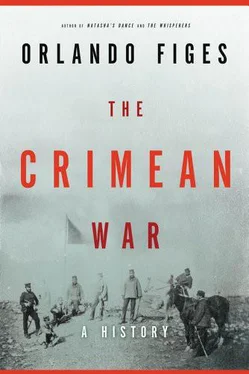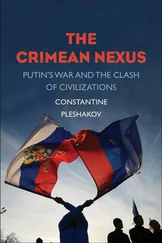It was always unclear how serious she was about this ‘Greek Project’. In the form that it was drawn up by Count Bezborodko, her private secretary and virtual Foreign Minister, in 1780, the project involved nothing less than the expulsion of the Turks from Europe, the division of their Balkan territories between Russia and Austria, and the ‘re-establishment of the ancient Greek empire’ with Constantinople as its capital. Catherine discussed the project with the Austrian Emperor Joseph II in 1781. They agreed on its desirability in an exchange of letters over the next year. But whether they intended to carry out the plan remains uncertain. Some historians have concluded that the Greek project was no more than a piece of neoclassical iconography, or political theatre, like the ‘Potemkin villages’, which played no real part in Russia’s foreign policy. But even if there was no concrete plan for immediate action, it does at least seem fairly clear that the project formed a part of Catherine’s general aims for the Russian Empire as a Black Sea power linked through trade and religion to the Orthodox world of the eastern Mediterranean, including Jerusalem. In the words of Catherine’s favourite poet, Gavril Derzhavin, who was also one of Russia’s most important statesmen in her reign, the aim of the Greek project was
To advance through a Crusade,
To purify the Jordan River,
To liberate the Holy Sepulchre,
To return Athens to the Athenians,
Constantinople – to Constantine
And re-establish Japheth’s Holy Land. [1] According to medieval Russian chronicles, the lands of Japheth were settled by the Rus′ and other tribes after the Flood in the Book of Genesis.
‘Ode on the Capture of Izmail’
It was certainly more than political theatre when Catherine and Joseph, accompanied by a large international entourage, toured the Black Sea ports. The Empress visited the building sites of new Russian towns and military bases, passing under archways erected by Potemkin in her honour and inscribed with the words ‘The Road to Byzantium’. 16Her journey was a statement of intent.
Catherine believed that Russia had to turn towards the south if it was to be a great power. It was not enough for it to export furs and timber through the Baltic ports, as in the days of medieval Muscovy. To compete with the European powers it had to develop trading outlets for the agricultural produce of its fertile southern lands and build up a naval presence in the warm-water ports of the Black Sea from which its ships could gain entry to the Mediterranean. Because of the odd geography of Russia, the Black Sea was crucial, not just to the military defence of the Russian Empire on its southern frontier with the Muslim world, but also to its viability as a power on the European continent. Without the Black Sea, Russia had no access to Europe by the sea, except via the Baltic, which could easily be blocked by the other northern powers in the event of a European conflict (as indeed it would be by the British during the Crimean War).
The plan to develop Russia as a southern power had begun in earnest in 1776, when Catherine placed Potemkin in charge of New Russia ( Novorossiia ), the sparsely populated territories newly conquered from the Ottomans on the Black Sea’s northern coastline, and ordered him to colonize the area. She granted enormous tracts of land to her nobility and invited European colonists (Germans, Poles, Italians, Greeks, Bulgarians and Serbs) to settle on the steppelands as agriculturalists. New cities were established there – Ekaterinoslav, Kherson, Nikolaev and Odessa – many of them built in the French and Italian rococo style. Potemkin personally oversaw the construction of Ekaterinoslav (meaning ‘Catherine’s Glory’) as a Graeco-Roman fantasy to symbolize the classical inheritance that he and the supporters of the Greek project had envisaged for Russia. He dreamed up grandiose neoclassical structures, most of which were never built, such as shops ‘built in a semicircle like the Propylaeum or threshold of Athens’, a governor’s house in the ‘Greek and Roman style’, law courts in the shape of ‘ancient basilicas’, and a cathedral, ‘a kind of imitation of St Paul’s outside the walls of Rome’, as he explained in a letter to Catherine. It was, he said, ‘a sign of the transformation of this land by your care, from a barren steppe to an ample garden, and from the wilderness of animals to a home welcoming people from all lands’. 17
Odessa was the jewel in Russia’s southern crown. Its architectural beauty owed a great deal to the Duc de Richelieu, a refugee from the French Revolution, who for many years served as the city’s governor. But its importance as a port was the work of the Greeks, who were first encouraged to settle in the town by Catherine. Thanks to the freedom of movement afforded Russian shipping by the Treaty of Kuchuk Kainarji, Odessa soon became a major player in the Black Sea and Mediterranean trade, to a large degree supplanting the domination of the French.
Russia’s incorporation of the Crimea followed a different course. As part of the Treaty of Kuchuk Kainarji, the Crimean khanate had been made independent of the Ottomans, although the Sultan had retained a nominal religious authority in his role as caliph. Despite their signature on the treaty, the Ottomans had been reluctant to accept the independence of the Crimea, fearing it would soon be swallowed up by the Russians, like the rest of the Black Sea coast. They held on to the powerful fortress of Ochakov at the mouth of the Dnieper river from which to attack the Russians if they intervened in the peninsula. But they had little defence against Russia’s policy of political and religious infiltration.
Three years after the signing of the treaty, Şagin Giray was elected khan. Educated in Venice and semi-Westernized, he was Russia’s preferred candidate (as the head of a Crimean delegation to St Petersburg, he had impressed Catherine with his ‘sweet character’ and handsome looks). Şagin was supported by the Crimea’s sizeable Christian population (Greek, Georgian and Armenian traders) and by many of the Nogai nomads on the mainland steppe, who had always been fiercely independent of the Ottoman khanate and owed their allegiance to Şagin as Commander of the Nogai Horde. Şagin, however, was unacceptable to the Ottomans, who sent a fleet with their own khan to replace him and encouraged the Crimean Tatars to rise up against Şagin as an ‘infidel’. Şagin fled, but soon returned to carry out a slaughter of the rebellious Tatars that appalled even the Russians. In response, and encouraged by the Ottomans, the Tatars began a religious war of retribution against the Christians of the Crimea, prompting Russia to organize the latter’s hurried exodus (30,000 Christians were moved to Taganrog, Mariupol and other towns on the Black Sea coast, where most of them became homeless).
The departure of the Christians seriously weakened the Crimean economy. Şagin became even more dependent on the Russians, who began to pressure him to accept annexation. Anxious to secure the Crimea before the rest of Europe could react, Potemkin prepared for a quick war against the Turks, while procuring Şagin’s abdication in return for a magnificent pension. With the Khan removed to St Petersburg, the Tatars were persuaded to submit to Catherine. Throughout the Crimea there were stage-managed ceremonies where the Tatars gathered with their mullahs to swear an oath on the Koran to the Orthodox Empress a thousand kilometres away. Potemkin was determined that the annexation should at least appear to be the will of the people.
The Russian annexation of the Crimea, in 1783, was a bitter humiliation for the Turks. It was the first Muslim territory to be lost to Christians by the Ottoman Empire. The Grand Vizier of the Porte reluctantly accepted it. But other politicians at the Sultan’s court saw the loss of the Crimea as a mortal danger to the Ottoman Empire, arguing that the Russians would use it as a military base against Constantinople and Ottoman control of the Balkans, and they pressed for war against Russia. But it was unrealistic for the Turks to fight the Russians on their own, and Turkish hopes of Western intervention were not great: Austria had aligned itself with Russia in anticipation of a future Russian-Austrian partition of the Ottoman Empire; France was too exhausted by its involvement in the American War of Independence to send a fleet to the Black Sea; while the British, deeply wounded by their losses in America, were essentially indifferent (if ‘France means to be quiet about the Turks’, noted Lord Grantham, the Foreign Secretary, ‘why should we meddle? Not time to begin a fresh broil’). 18
Читать дальше












